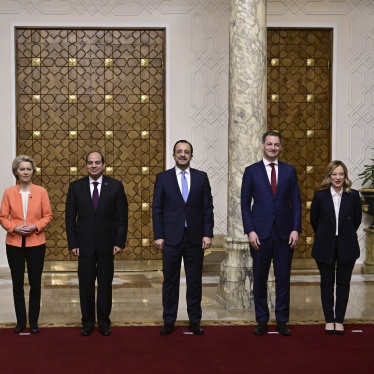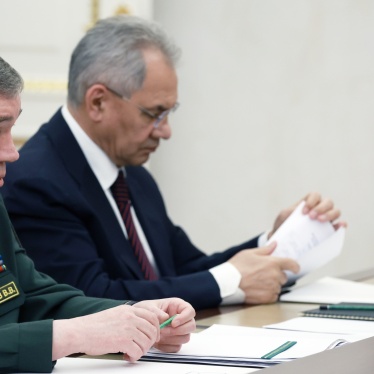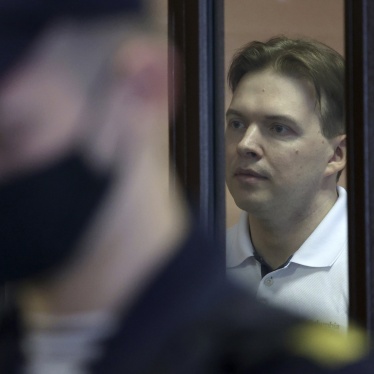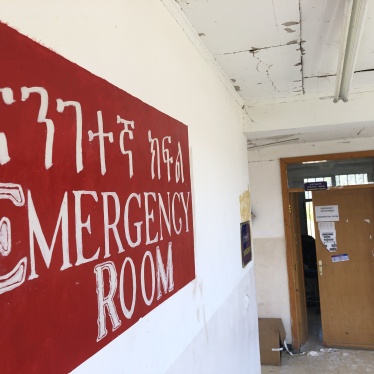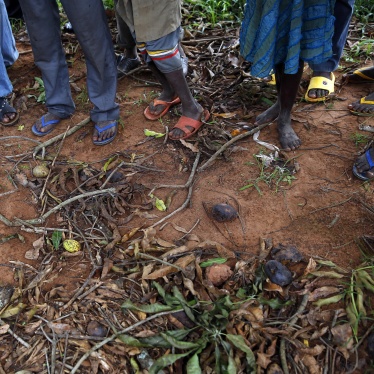Human Rights Watch was deeply concerned by the bombings that occurred in Tashkent on July 30 and by the March 29-April 2 bombings and violence. We extend our condolences to the families of those whose lives were lost or who were injured in this violence.
Human Rights Watch values its dialogue with the government of Uzbekistan on critical issues relating to human rights and the need to initiate reforms. We were pleased to continue this dialogue in a series of meetings held in March with high-level officials in advance of the release of our report, “Creating Enemies of the State.” The report documents the Uzbek government’s unstated policy of persecuting independent Muslims whom the government believes to be religious extremists. We discussed with officials the report’s findings, including the conclusions that criminal prosecutions of those independent Muslims not charged with violent acts amounted to persecution, and that the harassment, arbitrary arrest, incommunicado detention, unfair trials, and torture associated with this policy are widespread. We also discussed the report’s recommendations on how to end as well as prevent these abusive practices.
We are concerned that these violations continue, and that there has been little movement toward reform. This was demonstrated in the aftermath of the March-April violence, when the government targeted independent Muslims for arbitrary arrest and other violations. This letter describes these violations and suggests recommendations for addressing them.
In our discussions in March and in many public statements, government officials justified the criminal prosecution of suspected Islamic “extremists” by referring to the need to prevent terrorism, even though those prosecuted are not accused of committing any violent act or conspiring to commit such acts. We discussed the need to distinguish between those connected to acts of violence and those whose religious affiliations and practices, while at variance with state policy, are peaceful.
In December, the United Nations General Assembly adopted a resolution reaffirming member states’ duty to ensure that measures taken to combat terrorism must comply with their obligations under international law, in particular international human rights, refugee, and humanitarian law. Commenting on the need to balance these twin imperatives, the Office of the High Commissioner for Human Rights has said:
No one doubts that States have legitimate and urgent reasons to take all due measures to eliminate terrorism. Acts and strategies of terrorism aim at the destruction of human rights, democracy and the rule of law. They destabilize Governments and undermine civil society. Governments therefore not only have the right, but also the duty to protect their nationals and others against terrorist attacks and to bring the perpetrators of such acts to justice. The manner in which counter-terrorism efforts are conducted, however, can have a far-reaching overall effect on overall respect for human rights.
Human rights law establishes a framework in which terrorism can be effectively countered without infringing on fundamental freedoms.1
Under this framework, all governments are obliged to protect the rights of the accused and respect the rule of law in criminal prosecutions; under it, governments cannot limit fundamental rights, even in times of emergency or because of national security concerns. These include the rights to life, security of the person, freedom from torture, and the freedom of thought, conscience and religion.
Arbitrary Arrests and Procedural Violations
In the days and weeks immediately following the March violence, authorities arrested and detained hundreds of religious Muslims, including former religious prisoners and their relatives, as well as people registered on the police or Mahalla committee lists [uchyot] as being religious Muslims. In these cases, police used the opportunity of the violence to arbitrarily detain and arrest religious people with no apparent connection to the violence at all. In some cases they were released after several days without any charges, indicating that their religious background was the sole motivation.
Human Rights Watch documented more than 100 arrests in the wake of the March-April violence that followed the pattern of persecution, detailed in “Creating Enemies of the State.” To our knowledge, in the majority of cases those arrested were not charged in relation to the violence. In many cases, the police made arrests without warrants and conducted unsanctioned searches of the individuals’ homes, often seizing legal items, such as Korans, religious books in Arabic, and religious cassettes and pamphlets freely available outside mosques.
Human Rights Watch received allegations from relatives of those arrested that police planted evidence such as illegal religious pamphlets, bullets or small amounts of narcotics, sometimes in full view of family members and witnesses. For example, police arrested on weapons charges Rustam Yusupov, a former religious prisoner who had been amnestied on April 3. His wife reported to Human Rights Watch that the police arrived to search her home with the search report, indicating where the gun was found, already filled in. In another case, police reportedly openly planted drugs on Nuriddin Tokhirov, a former religious prisoner. His wife told Human Rights Watch that when her husband protested, the police officer gave Tohkirov the choice of having religious literature, weapons or narcotics planted on him, recommending that if he chose narcotics, he would receive the lightest sentence.
Trials of those arrested during this period are on-going, and several have already been completed, with the defendants in many cases receiving long prison sentences on charges of religious extremism and questionable narcotics and weapons possession. These trials have consistently failed to meet basic due process and fair trial standards. To give just one example, at the July 23 sentencing of ten men arrested in Margilan on April 3, the guards at the Fergana Province Court barred most relatives and defense attorneys from the court room, violating the right to an open hearing. Several observers told Human Rights Watch that after one of the defendants, Hairullo Obidov, requested that his tight handcuffs be loosened to release pressure on his arm, five guards dragged the defendant from the courtroom and brought him back approximately twenty minutes later bruised and disheveled. They also report that they then threw the defendant onto the floor of the defendants’ cage and beat him while the judge read the sentence.
Torture and Incommunicado Detention
Like the cases documented in “Creating Enemies of the State,” many of those arrested following the March violence have been held in incommunicado detention for days, weeks, or even months. In some cases, family members do not even know where their relative is being held. Incommunicado detention violates fundamental protections enshrined in international law and applicable human rights standards, such as Article 9 of the International Covenant on Civil and Political Rights (ICCPR), which provides for liberty and security of the person, protects against arbitrary detention and provides for the right to information about the charges and judicial review of attention. It also violates Article 14, which protects the right to access to counsel. Detainees held incommunicado are particularly vulnerable to torture and mistreatment. The U.N. Human Rights Committee has said that incommunicado pre-trial detention carries the inherent risk of torture or ill-treatment, and that it is not a legitimate law enforcement tool in combating terrorism, even for short periods of custody. 2
Bakhtior Muminov is a religious Muslim who, according to family members, prays and reads Koran at home and does not attend mosque. According to relatives, six plainclothes officers who identified themselves as National Security Service officers detained Muminov at his home in Chirchik, on the evening of March 29. The officers claimed that they needed to question him and that he would return home within two hours. They did not present any identification, warrant or subpoena. Two days later officers told the family that Muminov had been “tried” and was being held in the basement of the police station for five days to serve his sentence. After two more days, plainclothes officers detained Muminov’s brother, Abdumanob at his home, saying he could see Bakhtior. Officers held Abdumanob over night and interrogated him about his brother. When he was released, Abdumanob Muminov had bruises on the sides of his chest and he told his family that he was extremely frightened. He reported that the police had beaten him and hit him on the head during the interrogation.
Although Bakhtior Muminov’s relatives retained a lawyer, authorities did not allow the lawyer to see Muminov or even confirm his whereabouts. In June, his lawyer surmised that Muminov may be in pre-trial detention in Tashkent Prison, but gained access to him only on August 11, after repeated official requests and complaints. Investigators told the attorney that Muminov faces charges of terrorism, subversion, and organizing a criminal group, although they have not supplied an official indictment or other charging document. Muminov had apparently been assigned a public defender who was present for at least one of his early interrogations. But prior to August 11, for months Muminov had no attorney access. Human Rights Watch remains extremely concerned about Muminov’s well-being and requests that he be granted access to an independent forensic medical examiner to rule out torture and mistreatment. We also hope that he will have continued access to his attorney so that he may be able to fully prepare his legal defense.
Some have reported credible allegations of coercion and mistreatment during the investigation as well as limited access to their attorneys, lack of information on the charges against them and other due process violations. For example, police in Zangiota arrested Abdubosit Yusupov on March 29 while Yusupov was at the police station attempting to get information regarding the arrest of his two brothers earlier that day. All three brothers are religious Muslims. Yusupov is a former religious prisoner who had been amnestied after serving part of a sentence for anti-constitutional activities and narcotics possession. Police allege that they found narcotics in his pocket, although Yusupov says the police planted the drugs on him. His family retained an attorney, who was allowed to see Yusupov at Tashkent Prison for the first time on April 20. She told Human Rights Watch that Yusupov’s legs were swollen and he could barely walk. He had difficulty moving his arms and hands and could not grip a pen to sign his name. He had a large bruise on his upper right arm and burns on his face. Yusupov told his attorney that officers at the Tashkent Province Department of Internal Affairs beat him all over his body and on the soles of his feet, sodomized him with batons, set his beard on fire and handcuffed his arms behind his knees and suspended him from a rod threaded under his armpits for many hours.
Police in Ramitan, in Bukhara Province arrested Fazliddin Tukhtaev on March 29. Tukhtaev, who prays regularly and reads the Koran, is on the police list [uchyot] as a suspicious religious Muslim. His lawyer was only allowed to see him nearly four months later on July 23. He reported to his attorney that he had been beaten throughout his time in custody, but was too afraid to give details since prison guards were listening to the conversation. During that visit Tukhtaev signed a written request to the investigator to give his attorney access to the investigation materials. The next day he rescinded the request, raising concerns that he was pressured or coerced. Tukhtaev’s attorney has no access to the materials of the investigation.
Harassment
In other cases, the detentions lasted hours or days while police conducted interrogations and compelled people to write and sign statements about their activities such as when they began to wear hijab or where they learned to read Namaz. These interrogations and coerced statements did not relate to the March events, but rather to private religious activity, signaling that police arbitrarily targeted independent Muslims because of their beliefs and peaceful religious practices rather than for legitimate law enforcement purposes. Some people subjected to this treatment reported that police conducted unsanctioned searches of their homes, confiscating their documents, Korans, and other legal religious materials. Human Rights Watch also documented numerous cases of police harassing and intimidating people based on their religious beliefs, calling women who wear hijab “terrorists” and “suicide bombers” who pose a danger of blowing themselves up.
On March 31, Darmon Sultanova, the mother of two sons who were accused of “Wahhabism” and arrested in 1998, returned to her home in Chirchik, to find that police had taken her daughter, who is disabled, her daughter-in-law, and her three young grandchildren into custody.3 The chief of the Chirchik City Department of Internal Affairs told Human Rights Watch that the detention had been part of a policy of “preventative” measures.
The two women and three children were released later the same night. However, police refused to return their passports and other identification. Police also confiscated copies of the Koran and state-published religious pamphlets found in the family home during a search. The preventative detention imposed on Sultanova’s daughter, daughter-in-law, and grandchildren violate their right to be free of arbitrary detention, as it was, to the best of our knowledge, made sole on assumptions about their relationship to Sultanova’s sons, who are presumed to have been executed, and about their religious identity. During interrogation, officers called the women “Wahhabis” and threatened, “We will destroy you all.” Officers ordered the young women to stop wearing hijab, or Muslim attire ranging from a scarf covering the hair to clothing covering the entire body and face. Referring to Sultanova, who had been in Tashkent during the day, the head of the criminal investigations department reportedly asked, “What did she go to Tashkent for, to blow up the city?”
Mistreatment of Religious Prisoners
Another aspect of the policy of collective punishment pursued after the March violence is the mistreatment and torture of independent Muslims in prisons who are already serving sentences related to their religious beliefs. Soon after the March violence, in a presidential statement, you declared your intention to forgive perpetrators of religious extremism who asked for your forgiveness. Allegedly in response to this statement, prison officials throughout Uzbekistan used brutal methods to coerce religious prisoners, particularly those convicted of violating article 159, to beg for your forgiveness and sign statements admitting the error of their ways.
In this regard, I would especially like to draw your attention to Novoi Prison 64/29. On or about April 3, prison guards severely beat prisoners convicted under article 159 to force them to write statements begging the forgiveness of the president. Each prisoner was stripped, held down and beaten with batons on his legs and buttocks by six or seven prison guards until he agreed to make the required statement, which was videotaped by guards. One prisoner described it as his worst beating in the four years since he was convicted. After the beatings, the prisoners were forced to march around the prison yard. A visitor who saw several of these prisoners on July 10 reported that their injuries were still visible. According to him, their legs and buttocks were red. Haibubullo Madumarov reported to his father that he was beaten severely until he made a statement on videotape that he was properly sentenced and begs the forgiveness of the president. Then, guards threatened him with further beating to coerce him to say, on videotape, “Karimov is my father.”
Another example of the continued mistreatment and abuse of religious prisoners is new trials of those already serving sentences. Jamshid Vosiev and two other men already convicted and serving sentences in Novoi Prison under article 159 were charged with allegedly violating article 159 again, while in prison. Vosiev alleges that the charges stem from his refusal to beg forgiveness and repudiate their Islamic ideas and beliefs and are revenge for complaining about conditions to a government commission that inspected the prison earlier this year. On June 15 the Novoi Province court sentenced Vosiev to seven years of a strict prison regime, in addition to the eleven he has already been serving. However, the trial failed to meet basic fair trial standards. Vosiev’s lawyer was not permitted to participate in the investigation and saw his client for the first time at trial. Although the proceedings were open, the judge did not allow Vosiev’s mother in the courtroom during the questioning of witnesses from the prison. Several other witnesses who gave evidence against the defendants were not brought to court to testify, although the judge allowed their testimony as evidence. To the best of Human Rights Watch’s knowledge, the charges are based on allegations that Vosiev had a religious leaflet in his cell. The judge ignored Vosiev’s testimony that prison guards taped his mouth shut and beat him along with 100 other religious prisoners to force them to beg forgiveness. He also refused to allow Vosiev to undergo a forensic medical examination to determine whether he has injuries from beatings.
Judge Arziev of the Novoi Province Court refused to allow a representative of Human Rights Watch to observe the Vosiev’s appeal proceedings, even though he insisted the proceedings were open. He told Human Rights Watch that “we have our own protocol [for open trials] here in Novoi.” The judge later barred Vosiev’s mother from the courtroom.
Fears about Safety
At least five religious Muslim men have disappeared in recent months in Tashkent under suspicious circumstances, raising concerns that they may have been taken into custody. Their families fear for their safety and their attempts to locate them through official channels have so far yielded no results. Relatives of the men believe they may have been arrested because of their religious beliefs or their affiliations with particular institutions.
• Abdurasul Rakhimov, 32, went missing on July 14. His family reported that they last spoke to him by cell phone at approximately 7:00 p.m. that evening, while he was at work. By 10:00 p.m., his telephone was turned off. Rakhimov’s family is concerned that he was taken into custody because he is a religious Muslim who prays at a local mosque and is on the police list [uchyot] as a religious Muslim. As such he was required to write explanatory statements to the police each month, describing his whereabouts and activities. The police frequently came to his house to conduct checks of who was present and examine the family’s documents. Rakhimov had also studied Arabic at the Egyptian Cultural Center for several months last year and was a student of Farrukh Khaidarov (see below). The Ministry of Internal Affairs told the family that Rakhimov is not in its custody.
• At the time when he went missing, Rakhimov was with a friend, who is also missing. A photo of the friend reportedly figures in a chart of “Wahhabis” at the Tashkent Municipal Police Directorate, raising fears that he too may be in custody.
• Farukh Khaidarov, 31, went missing on June 25. According to relatives, he left home at 10:30 a.m. by car with his father and son and drove them to an event in Tashkent, but did not return to pick them up as planned. At 11:30 a.m., his wife called his cell phone, which was turned off. Relatives have not heard from him since. Khaidarov’s family has sent inquiries to the Ministry of Internal Affairs, the Tashkent City Department of Internal Affairs, the Prosecutor’s Office and the National Security Service, but has received no official information about Khaidarov’s whereabouts. Relatives report that they have been informed, informally, that Khaidarov’s case is being handled by the General Prosecutor’s office.
Police reportedly told Khaidarov’s wife that he has fled and she should stop looking for him in official custody. Representatives from the General Prosecutor’s office questioned Khaidarov’s relatives about whether he is affiliated with any organizations and told them that they refuse to consider him a missing person, but instead consider him “on the run.” They did not indicate whether there were any charges against him that he might be fleeing. Relatives doubt that Khaidarov left, however, as he had neither his passport nor much money with him when he left home.
• Okiljon Yunusov, 33, was last seen on May 28. Yunusov’s relatives report that he left his home in Zangiota, on the outskirts of Tashkent, by car to drive to Tashkent at 11:00 a.m. His wife spoke to him on his cell phone at approximately 4 p.m. When he did not return in the evening as expected, she called him again, but his cell phone was switched off. Relatives kept calling Yunusov’s cell phone; approximately a week after Yunusov’s disappearance, a man answered and screamed at them when they asked to meet with him.
Yunusov’s relatives have written to the Ministry of Internal Affairs and the National Security Service asking about his whereabouts but have not received replies. A month after Yunusov went missing, police summoned his wife and mother to the district police station and questioned them about their hijab (religious dress)—why they wear it, when they started wearing it and how many other relatives dress in hijab.
According to relatives of Khaidarov and Yunusov, the two men were acquaintances who are religious Muslims and attended mosque regularly. Khaidarov had even tried to help Yunusov’s family locate his whereabouts after he went missing. Khaidarov and Yunusov are both Arabic language specialists who attended university in Saudi Arabia on an Uzbek government program. Khaidarov teaches Arabic language at the Egyptian Cultural Center in Tashkent. His family is worried that he has been taken into custody because the young women who died allegedly in suicide attacks in Tashkent in March had studied Arabic at the same language center
• Khusniddin Nazarov disappeared from near his home in Tashkent on May 16. Nazarov is the son of Imam Obidkhon Nazarov, an influential and popular independent imam who disappeared in 1998. It is believed that Imam Nazarov has fled Uzbekistan or is still in custody. “Creating Enemies of the State” details the arrest and torture of Imam Nazarov’s relatives because of their connection to him.
Khusniddin Nazarov was detained in 2000 and questioned about his father’s whereabouts by the National Security Service, raising his family’s fear that he was again taken by the SNB. Nazarov’s lawyer has been told that he is not in Ministry of Internal Affairs custody. However, more than two months after Nazarov’s disappearance, his attorney has received no reply from the agency regarding whether Nazarov is in its custody.
Recommendations
We urge you to lead an effort to bring Uzbekistan’s policing practices, including those undertaken in the context of counterterrorism, into conformity with its international human rights obligations. In particular, we urge that you emphasize the need to:
• Provide the International Committee of the Red Cross (ICRC) with immediate and unfettered access to all suspects held in conjunction with the March events, and particularly to those held in places of temporary detention, such as Tashkent Prison and the basements of the Ministry of Internal Affairs, the Tashkent Municipal Police Directorate, and the National Security Service. ICRC monitoring is essential to prevent the torture and mistreatment of detainees and to lend the government’s investigation transparency and credibility.
• Ensure timely access to attorneys for all detainees. The Special Rapporteur on Torture has recommended that Uzbekistan allow for the unmonitored presence of legal counsel and relatives to detainees within 24 hours. Attorney access to detainees is a key safeguard to prevent torture and ill-treatment and helps ensure that evidence is gathered within the bounds of the law.
• Prioritize the adoption of legislation that would provide for judicial review of all detentions to determine the lawfulness of the detention. Judicial review of detention (habeas corpus) is a right guaranteed by international law. The Special Rapporteur on Torture has recommended that Uzbekistan implement habeas corpus to safeguard against arbitrary detention, torture, and mistreatment.
• Review all charges under article 159 of the Uzbek Criminal Code, which criminalizes “anti-constitutional activities” and drop charges where there is a lack of proof of the specific charge. The expansive scope and vague definition of article 159 and its broad application against independent Muslims render its use arbitrary. According to international legal principles, criminal conduct must be defined in law with “sufficient precision so as to prevent arbitrary enforcement.” 4
• Ensure adequate protection for all defense attorneys.
• Allow defendants’ relatives and independent observers to be present during all open proceedings.
• Investigate allegations of mistreatment of religious prisoners and take necessary steps to ensure their safety.
• If they are in custody, inform relatives of the whereabouts of Abdurasul Rakhimov, Farrukh Khaidarov, Okiljon Yunusov, and Khusniddin Nazarov, the charges against them and provide for immediate attorney access.
Human Rights Watch’s deputy program director, Widney Brown, will be in Tashkent September 23 and 24, and would be pleased to discuss with your representative the concerns detailed in this letter. I thank you for your attention to these concerns and welcome further dialogue on these issues.
Sincerely,
Rachel Denber
Acting Executive Director
Europe and Central Asia division
[1] Digest of jurisprudence of the United Nations and regional organizations on the protection of human rights while countering terrorism. Compiled by the Office of the United Nations High Commissioner for Human Rights, Geneva, New York and Geneva 2003.
[2] Digest of jurisprudence of the United Nations and regional organizations on the protection of human rights while countering terrorism.
[3] “Creating Enemies of the State” details how police tortured Sultanova’s sons following their arrest in 1998, detained Sultanova and physically mistreated her, put her and her sister under house arrest, and then arrested their elderly father on trumped-up narcotics charges. The young men confessed under torture to authorities’ accusations that they plotted to explode the Charvok dam outside Tashkent, and were sentenced to death by firing squad in 1999.
[4] Digest of jurisprudence of the United Nations and regional organizations on the protection of human rights while countering terrorism, p. 66.
